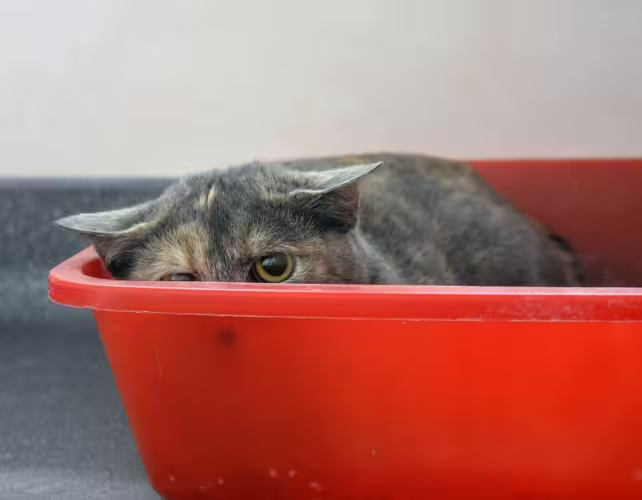4 Minutes
Understanding Feline Idiopathic Cystitis: More Than a Urinary Disorder
Feline idiopathic cystitis (FIC) is an enigmatic and distressing condition affecting domestic cats, marked by symptoms similar to lower urinary tract infections but with no identifiable bacterial cause. Recent research from Canadian scientists has brought new insights to light: extreme skittishness or anxious behavior in cats may serve as an early indicator that a cat is vulnerable to developing FIC—a disease whose origins remain unclear.
Cats with FIC often display telltale signs, including straining during urination, producing only small amounts of urine more frequently, or vocalizing pain when using the litter box. In severe cases, traces of blood may appear in the urine. However, unlike traditional urinary infections, diagnostic tests often reveal that urine from cats with FIC is sterile, leaving veterinarians to eliminate other medical causes before confirming an FIC diagnosis.
The Hidden Toll: Recurrences and the Link to Cat Anxiety
Statistical analysis underscores the seriousness of FIC: nearly half of the felines diagnosed with this disease will suffer at least one recurrence in their lifetime. Tragically, about 20% of cats with chronic FIC are euthanized—not because the disease itself is fatal, but due to the emotional distress and financial strain of repeated emergency treatments. Zoological medical scientist Marion Desmarchelier of the University of Montreal notes, “Some cats end up being euthanized because of it… the disease itself is not fatal, but the cost of repeated emergency treatments can be too much for some families.”

Previous studies point toward a complex interplay between a cat’s hormonal system and nervous system as the underlying mechanism. Specifically, the neurotransmitter adrenaline is believed to play a critical role. The prevailing hypothesis suggests that excessive adrenaline release can damage the bladder’s protective lining, exposing sensory nerves and leading to pain, inflammation, and an ongoing cycle of discomfort. If an affected cat’s body cannot temper this stress response due to previous damage, recurring episodes may follow.
The Psychological Dimension: Skittishness as a Red Flag
To probe the link between psychological well-being and FIC, Desmarchelier’s team surveyed owners of cats diagnosed with the condition during the COVID-19 pandemic. The questionnaire explored their pets’ behaviors, recurrence of symptoms, and adherence to recommended environmental modifications. Out of 33 valid responses, a striking pattern emerged: while just over half of cats experiencing a single episode were reported as shy or skittish around strangers, nearly all cats suffering from recurrent FIC displayed pronounced skittishness.
Interestingly, aggression—whether the cat was aggressive or a victim of aggression—did not correlate with recurrence risk. Instead, it was cats characterized by withdrawn or fearful behaviors who faced the greatest threat. "We initially thought that anxious, aggressive cats would be more prone to recurrent cystitis, but it's actually the fearful, withdrawn ones that seem to be at greater risk," Desmarchelier revealed.

Management and Future Directions: Prioritizing Mental Health in Cats
Given these findings, researchers advocate reframing FIC as a consequence of poor mental well-being rather than a primary bladder defect. This paradigm shift suggests that cultivating a stress-free, secure environment for pet cats may significantly reduce their risk of developing urinary tract inflammation.
Recommended strategies to support anxious cats include providing multiple safe spaces or hiding spots, ensuring they can withdraw from household activity when desired, and considering pheromone therapy to alleviate stress. Such measures not only enhance feline welfare but may also lower the incidence of recurrent, painful episodes of FIC.
The research underscores the need for further investigation into how environmental stress and psychological factors modulate urinary health in cats. Future studies may illuminate precise mechanisms connecting emotional distress and bladder dysfunction, potentially paving the way for targeted interventions.
For cat owners, these insights underscore the importance of vigilance: monitoring behavioral changes, especially heightened skittishness in stressful settings, could prove vital in safeguarding their pets’ health and comfort.
Conclusion
Feline idiopathic cystitis remains a medical puzzle, but advancing research reveals that anxiety and environmental stress in cats are likely key contributors. Early recognition of anxiety-related behaviors not only facilitates timely veterinary evaluation but may also prevent the cycle of discomfort and recurrence that puts so many beloved pets at risk. As we deepen our understanding of the interplay between mental well-being and physical health in cats, prioritizing their psychological comfort is essential—offering hope for more effective prevention and improved quality of life for felines worldwide.
Source: doi



Comments